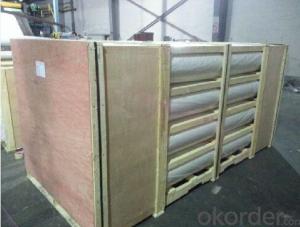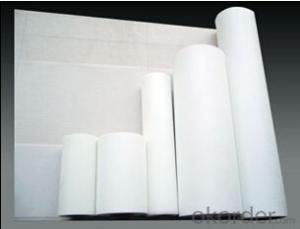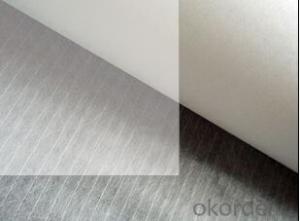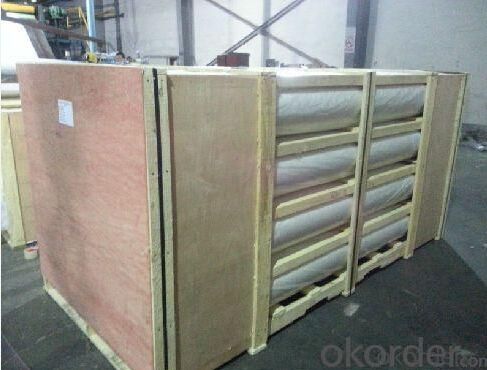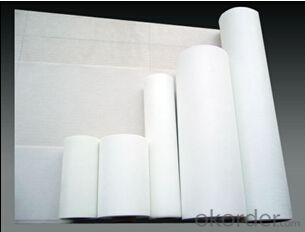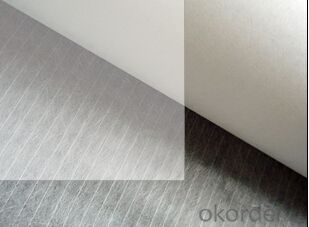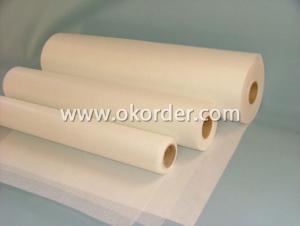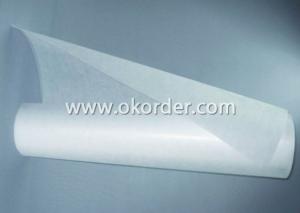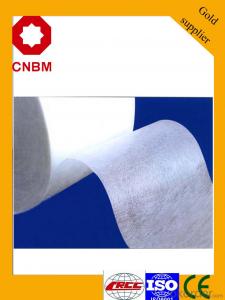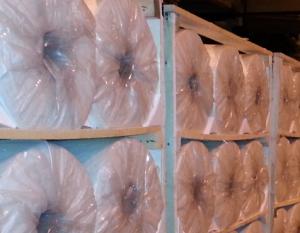Fiberglass Mat Tissue Waterproof Roofing Mat
OKorder Service Pledge
OKorder Financial Service
You Might Also Like
Introduction of E-glass Chopped Strand Mat
Chopped strand mat is made from fiberglass chopped strands boned with powder binder or emulsion binder.
E glass chopped strand mat is made from fiberglass strands chopped to length and bonded together with accessories, pipe, building materials, automobiles, furniture and other FRP products.
This products ischaracterized bg good combination of resin,easg operation ,good wet strengthretention,good laminate transparency
E glass chopped strand mat is made from fiberglass strands chopped to length and bonded together
with powder binder. Chopped strand mat is used primarily for hand lay-up processes, filament winding and press molding of FRP products. Typical products include bathroom
accessories, pipe, building materials, automobiles, furniture and other FRP products.
Features of E-glass Chopped Strand Mat
1.Warp and weft rovings aligned in a parallel,flat manner and uniform tension .
2.Densely alighed fibers,providing high dimensional stability ans easy handing .
3.Good moldability,fast and complete resin wet-out ,enabling high productively .
4.Good transporsision and hign strength of the composite products.
5.Even thickness ,no fuzz ,no stain.
6.Fast wet-out ,products with high strength ,little loss for strength in damp situation.
7.fiberglass woven roving has the features of : high tensile strength, corrosion resistance, flame retardance,insulativity.main function
8.applied to hand lay-up process
9.to reinforce UP resin
10.even thickness and flawless
11.good performance of processability in moulded parts
12.properties guaranteed under moisture condition
13.excellent mechanical strength during production of finished products
Features of E-glass Chopped Strand Mat
1.the composit products have high dry and wet tensile strenth and good transparency.
2.Low fuzz ,dirt ,impurity and other stain
Images of E-glass Chopped Strand Mat
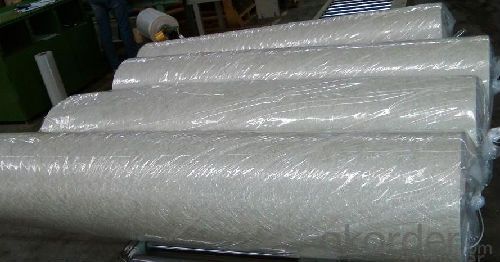
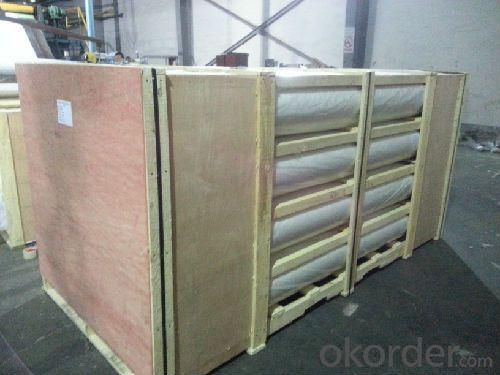
E-Glass Chopped Strand Mat Specification:
Property | Glass type | Weight(g/m2) | Width 200~3300 | Roll Weight | Moisture Content /% | Combustible Content /% | Breakage Strength /N |
Test Method | GB/T 1549 | ISO3374:2000 | ISO3374 | GB/T17470-1998 | ISO3344:1997 | ISO1887:1995 | ISO3342 |
EMC 80 | E-GLASS | 80±16 | ±5 | 6~50 | <0.2 | 13.6±0.35 | ≥200 |
EMC 100 | E-GLASS | 100±10 | ±5 | 6~65 | <0.2 | 9.5±0.35 | ≥170 |
EMC 150 | E-GLASS | 150±15 | ±5 | 6~97 | <0.2 | 8.0±0.35 | ≥40 |
EMC 225 | E-GLASS | 225±22 | ±5 | 6~150 | <0.2 | 5.0±0.6 | ≥60 |
EMC 300 | E-GLASS | 300±30 | ±5 | 6~180 | <0.2 | 4.0±0.6 | ≥90 |
EMC 450 | E-GLASS | 450±45 | ±5 | 6~180 | <0.2 | 3.8±0.6 | ≥120 |
EMC 600 | E-GLASS | 600±60 | ±5 | 6~240 | <0.2 | 3.6±0.6 | ≥150 |
EMC 900 | E-GLASS | 900±90 | ±5 | 6~190 | <0.2 | 3.4±0.6 | ≥180 |
FAQ of Chopped strand mat
1. Why Choose us?
CNBM is a stated own company, provide the guarantee for the best quality, best service and safety business.
2. How will we guarantee the quality?
a, ISO 9001-2008 quality control system;
b, Strict and regular quality control in production;
c, Inspeciation when loading into container before shippment;
d, Sample stock for one year for quality tracing and record.
3. What is your MOQ?
Our MOQ is one pallet.
4. Can you provide sample?
Yes, samples are in stock. we can offer free sample for you.
- Q: Can fiberglass mat tissue be used for pipe insulation?
- No, fiberglass mat tissue is not typically used for pipe insulation. Fiberglass mat tissue is a thin material that is commonly used for reinforcing purposes in various industries. It is not designed to provide thermal insulation or to prevent heat loss in pipes. For pipe insulation, materials such as foam, mineral wool, or fiberglass pipe insulation are more commonly used. These materials are specifically designed to provide thermal insulation and protect pipes from heat loss, condensation, and freezing.
- Q: What are the different reinforcement orientations available for fiberglass mat tissue?
- Fiberglass mat tissue offers several reinforcement orientations, each intended for specific purposes in different applications. One common orientation is unidirectional reinforcement, where fibers align in one direction. This orientation provides great strength and stiffness in that alignment, making it suitable for applications requiring resistance to tension or bending forces in a single direction. Another orientation is bidirectional reinforcement, where fibers align in two perpendicular directions. This orientation provides equal strength and stiffness in both directions, making it ideal for applications needing resistance to tension and compression forces. Structural components like panels, pipes, and tanks commonly employ bidirectional reinforcement. A third orientation is randomly oriented reinforcement, where fibers distribute randomly. This orientation offers isotropic properties, meaning it provides similar strength and stiffness in all directions. Random reinforcement is often used in applications requiring uniform strength and flexibility, like automotive parts, boat hulls, and sporting goods. Furthermore, hybrid reinforcement orientations are available, combining different fibers or orientations to meet specific performance requirements. These hybrids offer a combination of strength, stiffness, flexibility, and other desired properties, making them suitable for a wide range of applications. Overall, the choice of reinforcement orientation for fiberglass mat tissue depends on the application's specific requirements, including desired mechanical properties, forces to be resisted, and other performance considerations.
- Q: What is fiberglass mat tissue?
- Fiberglass mat tissue is a type of non-woven material made from glass fibers that are randomly oriented and bonded together with a binder. It is commonly used in various industries, including construction, automotive, and aerospace. The main purpose of fiberglass mat tissue is to provide strength, durability, and reinforcement to composite materials. It acts as a supporting layer between the resin and the glass fibers, helping to distribute stress and improve the overall mechanical properties of the final product. Fiberglass mat tissue has several advantages over other materials. It is lightweight, flexible, and easy to handle, making it ideal for applications that require complex shapes or curved surfaces. It also has excellent resistance to chemicals, moisture, and temperature changes, ensuring its longevity in harsh environments. In construction, fiberglass mat tissue is often used in the production of roofing materials, wall panels, and insulation boards. Its high strength-to-weight ratio makes it a popular choice for reinforcing concrete structures, such as bridges and buildings. In the automotive industry, fiberglass mat tissue is used in the manufacturing of car parts, such as body panels, bumpers, and interior components. It can enhance the structural integrity of these parts, making them more resistant to impacts and vibrations. In the aerospace industry, fiberglass mat tissue is employed in the production of aircraft components, such as wings, fuselages, and interiors. Its lightweight nature contributes to fuel efficiency and overall weight reduction, while still maintaining the necessary strength for safe flight. Overall, fiberglass mat tissue is a versatile and reliable material that plays a crucial role in enhancing the performance, durability, and safety of various products in different industries. Its unique properties make it an indispensable component in the production of composite materials.
- Q: Can fiberglass mat tissue be used for insulation in chemical storage tanks?
- Yes, fiberglass mat tissue can be used for insulation in chemical storage tanks. Fiberglass is known for its excellent insulation properties, making it a suitable material for insulating tanks that store chemicals. The fiberglass mat tissue is typically made from fine glass fibers that are woven together to create a strong and durable material. This mat tissue can be applied to the inner walls of the tank to provide insulation and prevent heat transfer. Additionally, fiberglass is corrosion-resistant and can withstand the harsh chemicals often stored in these tanks, making it an ideal choice for insulation in chemical storage tanks.
- Q: Can fiberglass mat tissue be used for insulating windows?
- No, fiberglass mat tissue is not suitable for insulating windows. It is primarily used for reinforcing and strengthening surfaces, such as in the construction industry, and is not designed to provide thermal insulation.
- Q: Can fiberglass mat tissue be used for bridge construction?
- Yes, fiberglass mat tissue can be used for bridge construction. Fiberglass mat tissue is a versatile material that offers several advantages. It is lightweight yet strong, making it suitable for use in bridge construction where weight considerations are important. Additionally, fiberglass mat tissue is highly durable and resistant to corrosion, which is crucial for the longevity and maintenance of bridges. It can also be easily molded into various shapes, allowing for flexibility in bridge design. Moreover, fiberglass mat tissue has good impact resistance and excellent fatigue performance, ensuring the bridge's ability to withstand heavy loads and constant traffic. Overall, fiberglass mat tissue is a reliable and cost-effective material for bridge construction.
- Q: Does fiberglass mat tissue provide good fire protection?
- No, fiberglass mat tissue does not provide good fire protection.
- Q: What are the different thickness tolerances for fiberglass mat tissue?
- The thickness tolerances for fiberglass mat tissue can differ depending on the manufacturer and product specifications. Generally, fiberglass mat tissue is offered in a range of thickness tolerances from 0.5 millimeters (mm) to 3 mm. The tolerance represents the acceptable range of thickness variation within a product. For instance, a fiberglass mat tissue with a thickness tolerance of +/- 0.5 mm means that the actual thickness can deviate by up to 0.5 mm in either direction from the specified thickness. The required tolerance for a specific application depends on the intended use and desired precision. Thicker fiberglass mat tissues with smaller tolerances are commonly utilized in applications that demand greater strength and durability, like reinforcing concrete in the construction industry or manufacturing composite materials. Conversely, thinner fiberglass mat tissues with larger tolerances may be employed in applications where flexibility and conformability take precedence, such as insulation or soundproofing in the automotive industry. To obtain accurate information regarding available thickness tolerances for fiberglass mat tissue, it is crucial to refer to the manufacturer's specifications or contact a supplier. These tolerances can significantly vary based on the specific product and supplier.
- Q: What are the properties of fiberglass mat tissue?
- Fiberglass mat tissue, also referred to as fiberglass mat or fiberglass matting, is a non-woven material made from glass fibers, possessing numerous properties that render it suitable for diverse applications. 1. With regards to strength and durability, fiberglass mat tissue is renowned for its high tensile strength, enabling it to endure substantial stress without fracturing. This quality makes it ideal for fortifying and reinforcing various materials and structures. 2. Despite its strength, fiberglass mat tissue remains relatively lightweight, facilitating easy handling and transportation. This characteristic proves particularly advantageous in industries where weight reduction plays a crucial role, such as aerospace and automotive. 3. The flexibility of fiberglass mat tissue allows it to conform to curved surfaces and intricate shapes. Consequently, it proves versatile and appropriate for applications requiring the material to be molded or shaped into specific designs. 4. Fiberglass mat tissue exhibits excellent resistance to various chemicals, including acids, alkalis, and most solvents. This attribute renders it suitable for use in corrosive environments, such as chemical processing plants or storage tanks. 5. Fiberglass mat tissue possesses commendable thermal insulation properties, effectively reducing heat transfer. Consequently, it proves valuable in applications necessitating heat insulation, such as the construction of walls, roofs, or insulation boards. 6. Inherently fire-resistant, fiberglass mat tissue does not contribute to the propagation of flames. As a result, it finds extensive use in applications where fire safety is paramount, such as the production of fire-resistant doors, panels, or insulation materials. 7. Furthermore, fiberglass mat tissue offers excellent sound insulation properties, diminishing the transmission of noise through walls or other structures. This characteristic renders it suitable for implementation in soundproofing applications, such as recording studios or automotive interior panels. Overall, the properties exhibited by fiberglass mat tissue endow it with versatility, allowing for a wide range of applications across various industries, including construction, automotive, aerospace, and marine. Its strength, flexibility, lightweight nature, chemical resistance, thermal and sound insulation properties, as well as its fire resistance, contribute to its popularity and usefulness in numerous applications.
- Q: Can fiberglass mat tissue be used for automotive parts?
- Yes, fiberglass mat tissue can be used for automotive parts. Fiberglass mat tissue is a versatile material that provides strength, rigidity, and durability. It is commonly used in the automotive industry for various applications such as reinforcing panels, bumpers, hoods, and body parts. The fiberglass mat tissue is lightweight, making it suitable for reducing the overall weight of the vehicle and improving fuel efficiency. Additionally, it is resistant to corrosion, chemicals, and extreme temperature conditions, making it a reliable choice for automotive parts. The material's flexibility also allows for easy molding and shaping, enabling manufacturers to create complex designs and achieve desired aesthetics. Overall, fiberglass mat tissue is an excellent option for automotive parts due to its strength, durability, lightweight nature, and versatility.
Send your message to us
Fiberglass Mat Tissue Waterproof Roofing Mat
OKorder Service Pledge
OKorder Financial Service
Similar products
Hot products
Hot Searches
Related keywords
